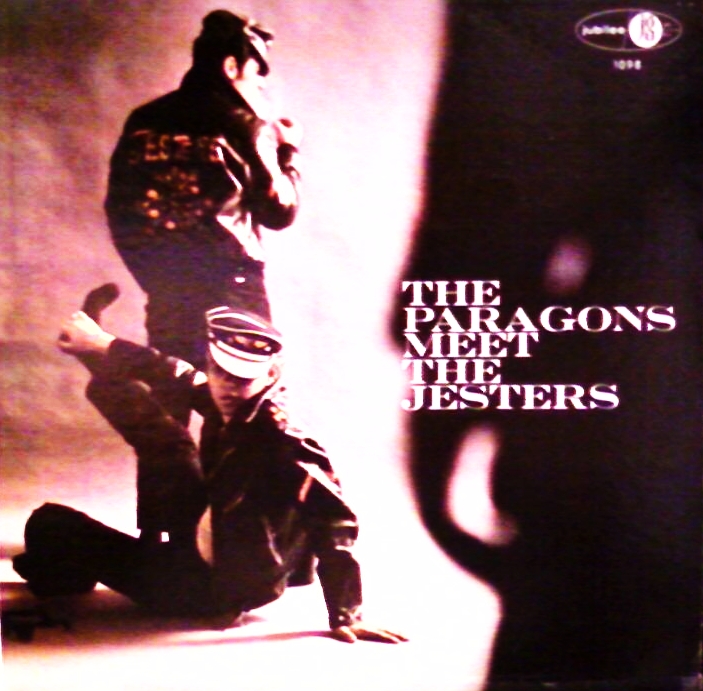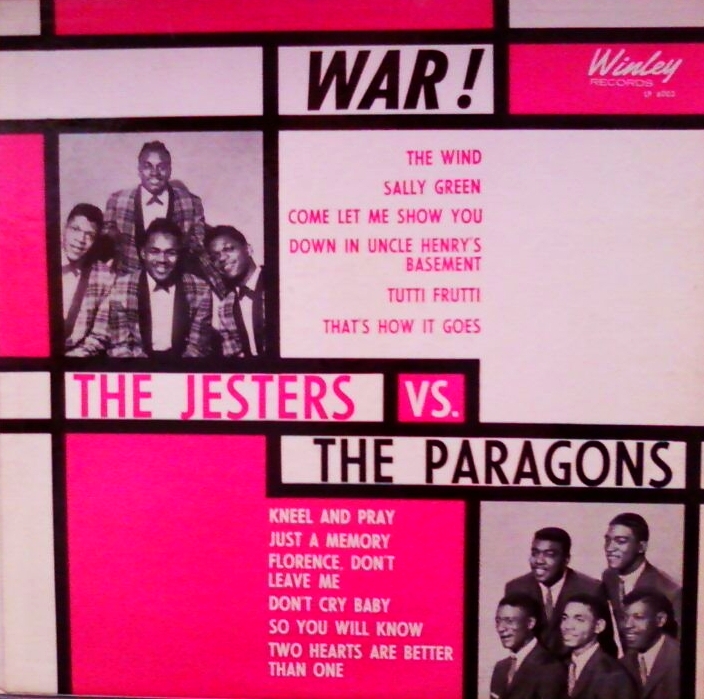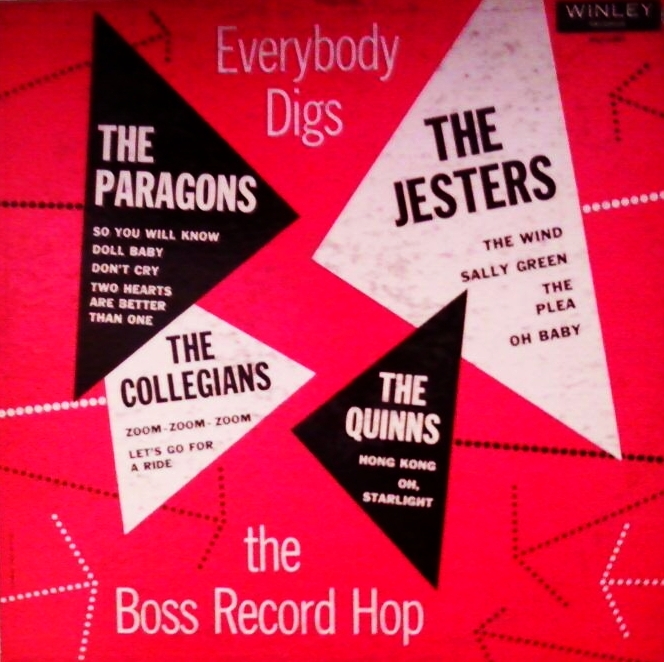In Jukebox Saturday Night, Jukebox Heart takes timeout to go back to our roots. The earliest music I remember hearing was early rock n roll and doo wop as I shared a bedroom with my older brother. He’d play his records on the old Motorola in the corner of our room. It was then that the passion for music and records began, and it’s like the meatloaf and mashed potatoes of my musical taste – definite comfort food.
And there is no record for which this is more true than The Paragons Meet The Jesters. In fact, this is somewhat of a family heirloom harking back to the rarest of times when my brother, sister and I all still lived with our parents in our Brooklyn home.
As it turns out, this is more than just a family heirloom; it is one of those important nodes in rock history, defining a moment in music and propelling the careers of several key people and setting the stage for some of the most important evolution in rock and R&B history. Some back story…
Paul Winley Records Inc. was the parsent company Winley Records, a doo-wop record label founded in 1956 that in the 1970s became Paul Winley Records, one of the earliest hip hop labels. It was situated on 125th Street, Harlem, New York City. Winley released doo-wop by The Paragons and The Jesters, and hip hop records by Paul Winley’s daughters, Tanya and Paulette, produced by Winley’s wife, Ann. The label can lay claim to a number of firsts: one of the earliest rock and roll compilations, one of the earliest breaks compilations, an early solo female rap artist and an early instance of social commentary in rap. Winley was also the first label to record one of hip hop’s most important figures, Afrika Bambaataa.
There’s lots more details below, but first, the music.
The first thing is the legendary album, The Paragons Meet The Jesters, recorded from a first pressing of the vinyl. The original jacket is shown below. The Paragons Meet The Jesters, first released in 1959 with its street gang cover and vocal duels inspired by doo-wop’s street corner singing battles and live show group competitions, was one of the first rock and roll compilation LPs and the most commercially successful doo wop compilation ever released.

The Paragons Meet The Jesters, Side 1
[audio:http://www.jukeboxheart.com/jsn/paragonsjesters/PvJs1.mp3]
The Paragons Meet The Jesters, Side 2
[audio:http://www.jukeboxheart.com/jsn/paragonsjesters/PvJs2.mp3]
Side 1 Playlist:
The Paragons – Florence
The Jesters – Please Let Me Love You
The Jesters – So Strange
The Paragons – Let’s Start All Over Again
The Jesters – Now That You’re Gone
The Paragons – The Vows of Love
Side 2 Playlist:
The Paragons – Hey Little School Girl
The Jesters – I’m Falling in Love
The Jesters Love – No One But You
The Paragons – Stick With Me Baby
The Jesters – I Laughed
The Paragons – Twilight
Through his association with the Clovers, Winley met legendary figure, Atlantic Records mogul Ahmet Ertegün, who — unusual for a label mogul — himself wrote for The Clovers subsequent to signing them. Winley moved to New York City to work with Ertegün, where he wrote for Ruth Brown and Big Joe Turner. He then became one of the songwriters working in and around the Brill Building in the 1950s, along with figures he met and knew there such as Otis Blackwell and Jesse Stone. Winley formed a songwriting partnership with Davey Clowney, better known as Dave “Baby” Cortez, and the two began recording doo-wop groups for the newly-founded Winley Records.

A rare first press of the Paragons’ first
single, Florence, from 1957, on the
signature orange label.
Winley Records’ main acts were The Paragons and The Jesters, but they also introduced Little Anthony and the Imperials, then known as The Duponts. Then came The Jesters, students at Cooper Junior High School in Harlem who graduated from singing under an elevated train station near 120th Street to the amateur night contest at the Apollo, where Paul Winley discovered them. A brother group to The Jesters were The Paragons – described by Wiley as real hoodlums, real zip-gun, street-warring hoodlums.
Much less known is the Winley records follow-up to The Paragons Meet The Jesters, The Paragons Vs. The Jesters – WAR! as shown below. This features later, less successful sides, but with some wonderful songs nonetheless.

The Paragons Vs. The Jesters WAR! Side 1
[audio:http://www.jukeboxheart.com/jsn/paragonsjesters/PJWs1.mp3]
The Paragons Vs. The Jesters WAR! Side 2
[audio:http://www.jukeboxheart.com/jsn/paragonsjesters/PJWs2.mp3]
Side 1 Playlist – The Jesters
The Wind
Sally Green
Come Let Me Show You
Down In Uncle Henry’s Basement
Tutti Frutti
That’s How It Goes
Side 2 Playlist – The Paragons
Kneel and Pray
Just A Memory
Florence Don’t Leave Me
Don’t Cry Baby
So You Will Know
Two Hearts Are Better Than One

Several tracks from the Paragons and The Jesters never made it to either compilation, but were included on this one, and are presented here, along with some great tracks from the labels other groups, The Quinns and The Collegians.
Selected Tracks from Everybody Digs The Boss Record Hop
The Jesters – The Plea
[audio:http://www.jukeboxheart.com/jsn/paragonsjesters/ThePlea.mp3]
The Jesters – Oh Baby
[audio:http://www.jukeboxheart.com/jsn/paragonsjesters/ohbaby.mp3]
The Paragons – Doll Baby
[audio:http://www.jukeboxheart.com/jsn/paragonsjesters/paragonsohbaby.mp3]
The Collegians – Zoom Zoom Zoom
[audio:http://www.jukeboxheart.com/jsn/paragonsjesters/zoomzoomzoom.mp3]
The Collegians – Let’s Go For A Ride
[audio:http://www.jukeboxheart.com/jsn/paragonsjesters/letsgoforaride.mp3]
The Quinns – Hong Kong
[audio:http://www.jukeboxheart.com/jsn/paragonsjesters/quinnshongkong.mp3]
The Quinns – Oh Starlight
[audio:http://www.jukeboxheart.com/jsn/paragonsjesters/quinnsohstarlight.mp3]
Winley Records resurfaced in the 1970s with a series of releases which—like the street corner practices of doo-wop foreshadowing those of hip hop — would in their different ways presage the advent of commercially recorded hip hop even as that movement blossomed in the Bronx and spread to the streets of Harlem. Winley released a series of speeches by Malcolm X, tied into a tradition of black oratory and to be sampled a decade later by Public Enemy and others. The label also recorded Harlem Underground Band (featuring a young George Benson), whose “Smokin’ Cheeba Cheeba” (1976) would furnish a break for hip hop’s burgeoning breakbeat culture.
A “break” was a short percussive passage in a record which hip hop DJs would loop (using two copies, one for each turntable) in order for it to be rapped over and/or danced to. By the late 1970s, “b-boy” sections were appearing in some small New York record stores, catering to “b-boys”, followers of this yet-to-be-named new subculture, who would buy 45s, 12″s or complete albums, old or new, of funk, rock or indeed any genre, as long as they were satisfied that each contained at least a few seconds worthy of being looped.
Paul Winley’s daughter Tanya was such a follower. Paul began collecting songs containing popular breaks and compiling them on a series of records called Super Disco Breaks, beginning in 1979 and eventually running to six volumes. The first of these therefore was one of the earliest records released with hip hop culture in mind, and probably the first breakbeat record in history.
Harlem Underground Band, augmented with the organ of the seemingly ever-present “Baby” Cortez, would function as the house band backing Winley’s hip hop releases, hence having the same function, if not influence, as “Jiggs” Chase’s band at Sugar Hill Records, or those of Pumpkin at Enjoy Records and elsewhere, i.e. solving the problem of how to translate the backing to raps heretofore provided live by DJs.
A new generation of acts appeared in the early to mid 1980s on labels like Def Jam, Profile and Cold Chillin’, with a tougher image, musical style and lyrical delivery than their predecessors Thissignaled the end for labels like Enjoy, Sugar Hill and Winley. After releasing “Street Rock” by Rap Dynasty in 1984, the label folded, though two discs appeared in 2007 bearing the imprint’s name and purporting to contain Bambaataa material from the 1970s. A collection of Winley hip hop, Death Mix: The Best of Paul Winley Records, was released on Landspeed Records in 2001.
